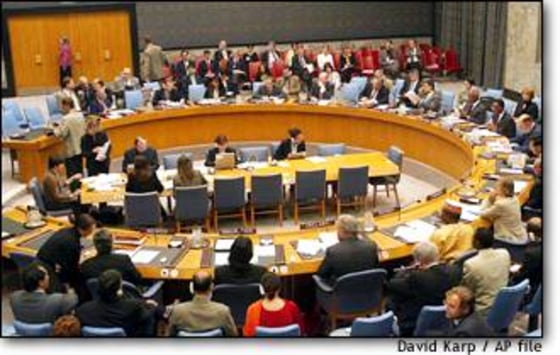The U.S. push for a tough new resolution on Iraq has stalled at the United Nations, diplomatic sources said Wednesday. The process, which Washington hoped to complete a week ago, must now await a decision by the White House on how to reach a deal with the key Security Council nations opposed to the automatic right to military action against Iraq if it doesn’t disarm.
The U.S. approach has been complicated by the debate on Capitol Hill over a congressional resolution that would grant President Bush the right to wage war on Iraq.
On Wednesday, Bush pressed his case for one sternly worded U.N. resolution on Iraq in a telephone conversation with France’s president, Jacques Chirac.
But France, along with Russia and China — three of the five permanent members of the U.N. Security Council — want two resolutions, one that would set the terms for weapons inspectors, and a second that would spell out the consequence of non-compliance, including the possibility of force.
Britain has embraced the U.S. approach, but Washington needs to reach a deal with all five members because they hold veto power over any new resolution.
‘Holding pattern’
“The process is in a holding pattern until the five countries receive further guidance from their capitals,” one diplomat said, speaking on condition of anonymity.
Russia’s ambassador to the United Nations, Sergei Lavrov — in charge of coordinating the permanent five’s calendar for October — told the other members on Tuesday that he didn’t think it was productive to hold further formal meetings without guidance from the capitals.
Otherwise, Lavrov indicated, the members were merely rehashing the same issues without making progress.
The United States has made some progress in pushing the Security Council toward a new resolution. Previously, both France and Russia indicated that the weapons inspectors should resume their work in Iraq under the terms of previous resolutions.
But the U.S. demands outlined in its draft, including a full inventory from Iraq within 30 days covering all aspects of its alleged programs to develop weapons of mass destruction, as well as other weaponry, may not be acceptable in full to the other permanent members, diplomats said.
However, they are now backing Washington’s demand that Iraq’s presidential palaces — previously subject to a separate agreement that forbade surprise visits — be open to weapons inspectors.
French diplomat Yves Doutriaux said presidential sites “must be inspected without limitations.”
Last week, Iraq agreed to allow weapons inspectors back into the country — after a four-year hiatus — but only under the terms of previous U.N. resolutions.
Waiting for Congress
Another issue overshadowing deliberations at the United Nations is the debate in Congress.
One diplomat said that Washington may wait until the congressional process is complete before returning to the United Nations.
This diplomat, who is not affiliated to the permanent five, suggested the delays could push back a resolution by as much as two weeks. He described the U.S. approach as “hurry up and wait.”
Another diplomat noted that while the often-acrimonious congressional debate “is not driving the process up here,” passage of a domestic U.S. resolution would allow Bush demonstrate that the American people are behind his policy.
In the long run, however, it’s only a decision reached at the highest levels in the various Security Council countries that will reinvigorate the debate at the United Nations, diplomats said.
State Department spokesman Richard Boucher said Wednesday that the U.N. deliberations are focusing on coming to terms with the concepts in the resolution and not merely the language of the resolution.
Boucher noted there was agreement on the need for “unfettered and unrestricted inspections,” and that the Security Council has to define exactly what that means.
“There needs to be constant pressure on Iraq, there needs to be a way for the council to express its determination to draw the consequences,” he said.
(Linda Fasulo is NBC’s U.N. correspondent. Sean Federico-O’Murchu is an international editor/producer for MSNBC.com. )
